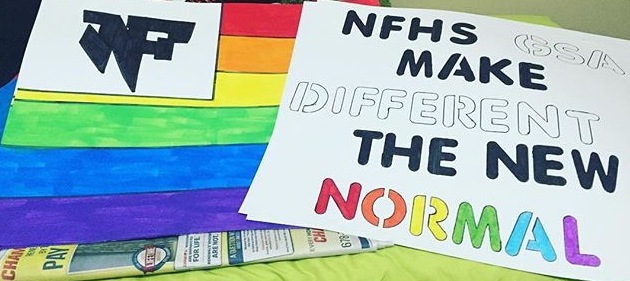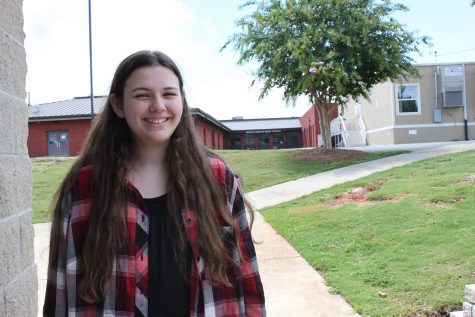GSA Creates Safe Community; Parents Shouldn’t Object
The picture shows two signs advertising the GSA at North High. The one on the right reads “NFHS GSA MAKE DIFFERENT THE NEW NORMAL” which is to sum up a huge part of the club’s purpose, making LGBTQ+ students feel less estranged. Photo by Diana Rodgers.
October 5, 2016
In every school, there is a population of LGBTQ+ (lesbian, gay, bisexual, trans, queer/questioning, etc.) students. Many of these students feel unloved, unaccepted, or isolated by their peers. Often times, this lack of acceptance from their peers can lead to very negative consequences.
Let’s look at some statistics for LGBTQ+ students:
- Nine out of ten LGBTQ+ students have been harassed or assaulted during the past year
- Six out of ten LGBTQ+ students felt less safe at school than their non-lgbtq peers
- Almost half of transgender people have seriously considered taking their own life and one out of four reported an attempt
- Lesbian, gay, or bisexual youth are four times as likely to take their own life as compared to their straight peers
These shocking statistics sadden many people including myself greatly, but there is something that can change them.
GSAs (Gay Straight Alliances) aim to create a safe space and community for members of the LGBTQ+ community as well as their allies. A study of LGBTQ+ students aged 13 to 22 showed that in schools without GSAs, 33.1 percent of LGBTQ+ students attempted suicide while 16.9 percent of LGBTQ+ students who attend a school with a GSA attempted suicide. North Forsyth High School does have a GSA; however, many parents will not allow their students to attend it.
Reasons vary from parent to parent, often involving religious beliefs or simply just not wanting their child to stick out from the crowd. What many parents do not understand is that their child will have to deal with rejection from their peers and family, but a club like this can really help them feel accepted, loved, and wanted.
Skyler Whitehead, Public Relations Officer for North Forsyth High School’s GSA said, “GSA really is supposed to be just a safe place for everyone who wants to be somewhere that they can be themselves and talk about issues, and I think it’s really important that parents let them come because sometimes GSA is the only place where they can actually feel safe.” Whitehead even goes on to express the academic value of this club by saying, “It’s actually very educational because we talk about news and past history.” Whitehead feels very strongly about the club and believes that all students should be able to join. He concludes his statement by saying, “we try to actually help each other and make a difference.”
The co-sponsor of NFHS’ GSA as well as the sponsor for young life, Joann Gunby, also believes that all students should be allowed to attend the club because whether the person is black, white, gay, straight, or anything else, she believes we’re all human, and to her that means we all deserve the same rights. When asked why she decided to sponsor the GSA, Gunby responded, “I sponsor the GSA for the same reason I sponsor young life; I have a heart for amazing kids, and all kids are amazing.”
I personally agree with both of their opinions, and I believe that parents should allow their students to join the GSA whether or not they believe in the cause it supports. The simple fact is, the club isn’t about rebelling against parents, forcing opinions on students, or anything that some parents seem to think it is. The GSA is about being who we are, feeling loved and accepted, helping each other through the many hardships we will face during high school whether they are LGBTQ+ related or not, creating a community, making a huge school feel a little smaller, and supporting and loving everyone no matter what they believe.
Parents, whether your child is part of the LGBTQ+ community or just an ally, if they want to attend this club, you should have a talk with them about it. If you don’t like the club, make your reasoning clear but please keep an open mind towards what your child has to say. Chances are they understand what they are doing and have very valid reasons for doing so. I believe you should allow them to attend if they give their case and you give yours, whether or not their case changes how you feel about the club because you never know what part of their case is left unspoken. Many parents never even realize that the things they tell their student not to do are the very things that may have kept their students alive until it’s too late. I beg of you, don’t let it be too late; talk to your child, and let their thoughts be heard.




